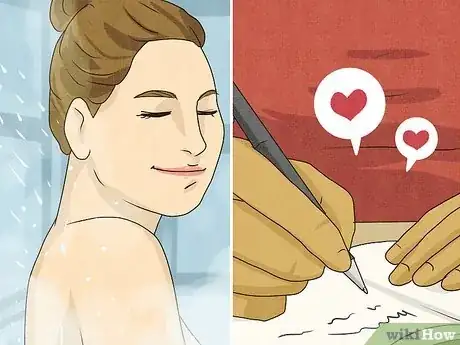This article was co-authored by Leslie Bosch, PhD and by wikiHow staff writer, Hannah Madden. Dr. Leslie Bosch is a Developmental Psychologist, National Board Certified Health and Wellness Coach, and Owner of Bosch Integrative Wellness. With over 15 years of experience, she specializes in providing stress relief coaching services to individuals and groups using a variety of scientifically proven methods for change including motivational interviewing, positive psychology, self-compassion, non-violent communication, social learning theory, and self-determination theory. Dr. Bosch received training from the Andrew Weil Center for Integrative Medicine at the University of Arizona and earned a PhD in Human Development and Family Studies from The University of Arizona. She is also a member of the National Board of Health and Wellness Coaching Association. Dr. Bosch has published many papers and been featured in the media numerous times.
There are 8 references cited in this article, which can be found at the bottom of the page.
This article has been viewed 61,259 times.
When you have your needs met as a child, you learn that you can rely on the people around you. But when your needs are ignored, it can cause you to develop an anxious, avoidant, or fearful attachment style. The fearful avoidant attachment style in particular might make you crave closeness and intimacy while simultaneously shying away from it. Understanding your attachment style and where it comes from can help you relearn attachment and work toward healthier relationships. In this article, we’ll tell you everything you need to know about a fearful avoidant attachment style and how you can overcome it.
Steps
Expert Q&A
-
QuestionWhat triggers a fearful avoidant?
 Leslie Bosch, PhDDr. Leslie Bosch is a Developmental Psychologist, National Board Certified Health and Wellness Coach, and Owner of Bosch Integrative Wellness. With over 15 years of experience, she specializes in providing stress relief coaching services to individuals and groups using a variety of scientifically proven methods for change including motivational interviewing, positive psychology, self-compassion, non-violent communication, social learning theory, and self-determination theory. Dr. Bosch received training from the Andrew Weil Center for Integrative Medicine at the University of Arizona and earned a PhD in Human Development and Family Studies from The University of Arizona. She is also a member of the National Board of Health and Wellness Coaching Association. Dr. Bosch has published many papers and been featured in the media numerous times.
Leslie Bosch, PhDDr. Leslie Bosch is a Developmental Psychologist, National Board Certified Health and Wellness Coach, and Owner of Bosch Integrative Wellness. With over 15 years of experience, she specializes in providing stress relief coaching services to individuals and groups using a variety of scientifically proven methods for change including motivational interviewing, positive psychology, self-compassion, non-violent communication, social learning theory, and self-determination theory. Dr. Bosch received training from the Andrew Weil Center for Integrative Medicine at the University of Arizona and earned a PhD in Human Development and Family Studies from The University of Arizona. She is also a member of the National Board of Health and Wellness Coaching Association. Dr. Bosch has published many papers and been featured in the media numerous times.
Developmental Psychologist There's simply no clear-cut answer here, as each case is unique. That said, a fearful avoidant attachment style is usually triggered by a lot of childhood trauma and dysfunctional home environments. In some cases, physical and sexual abuse can have a correlation with this attachment style as well. Only by looking inward and talking with a trusted professional will you have a more definitive answer.
There's simply no clear-cut answer here, as each case is unique. That said, a fearful avoidant attachment style is usually triggered by a lot of childhood trauma and dysfunctional home environments. In some cases, physical and sexual abuse can have a correlation with this attachment style as well. Only by looking inward and talking with a trusted professional will you have a more definitive answer.
References
- ↑ Leslie Bosch, PhD. Developmental Psychologist. Expert Interview. 20 May 2022.
- ↑ https://www.mayoclinic.org/healthy-lifestyle/adult-health/in-depth/self-esteem/art-20045374
- ↑ Taylor Rochestie. Professional Basketball Player. Expert Interview. 13 July 2021.
- ↑ https://www.helpguide.org/articles/relationships-communication/attachment-and-adult-relationships.htm
- ↑ Leslie Bosch, PhD. Developmental Psychologist. Expert Interview. 20 May 2022.
- ↑ Leslie Bosch, PhD. Developmental Psychologist. Expert Interview. 20 May 2022.
- ↑ https://www.helpguide.org/articles/relationships-communication/attachment-and-adult-relationships.htm
- ↑ https://www.mind.org.uk/information-support/types-of-mental-health-problems/self-esteem/tips-to-improve-your-self-esteem/
- ↑ https://www.helpguide.org/articles/relationships-communication/attachment-and-adult-relationships.htm
- ↑ Taylor Rochestie. Professional Basketball Player. Expert Interview. 13 July 2021.
- ↑ https://www.mayoclinic.org/healthy-lifestyle/adult-health/in-depth/self-esteem/art-20045374
- ↑ https://www.psychologytoday.com/us/blog/toxic-relationships/202104/how-change-your-attachment-style-and-your-relationships
- ↑ https://psychcentral.com/blog/how-to-figure-out-your-boundaries#1
- ↑ https://www.psychologytoday.com/us/blog/toxic-relationships/202104/how-change-your-attachment-style-and-your-relationships
- ↑ https://www.helpguide.org/articles/relationships-communication/attachment-and-adult-relationships.htm
- ↑ https://my.clevelandclinic.org/health/diseases/9761-avoidant-personality-disorder







































































